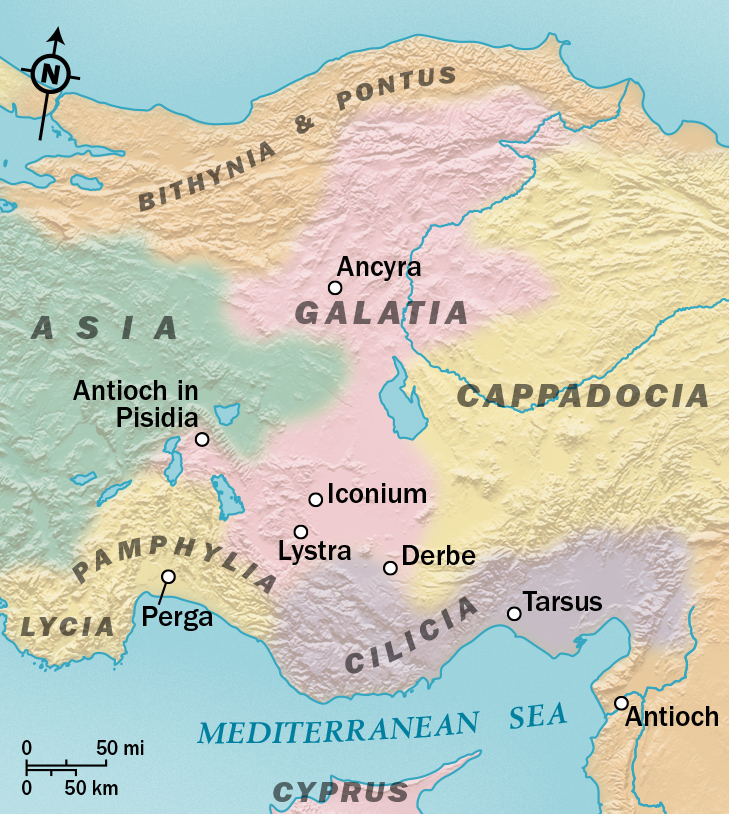CHAPTER FIFTEEN
The Letter to the Galatians
Orientation
Galatians shows us what righteous anger looks like. Paul is angry at the Galatian churches because they are threatening to abandon the true gospel. Nowhere else do we see him so upset, even with other churches that have made some ridiculously large blunders (think of the Corinthians!). The heat generated in this letter comes because the gospel itself is under attack, and where there is no gospel, there is no salvation. Paul even worries that some of the Galatians might not be saved at all. But the strength of Paul’s anger tells of his great love for the Galatians. He is upset because he cares about them and their salvation. The letter is the rebuke from a loving pastor who wants his people to come to their senses before it is too late.
The Historical Origins of Galatians
The heart of the problem is that the gentile Galatians think that they must become Jews under the law in order to be good Christians. This is symbolized by their desire to become circumcised. Paul rails against this thinking because all they need is Christ. They do not need to become Jewish, submit to the law, or get circumcised. If they think that these things are necessary, they have rejected the true gospel of Christ and have lost Christ by trying to add to him. It is a very strong letter that even records Paul’s rebuke of the apostle Peter for similar reasons.
Figure 15.1. Province of Galatia [© Baker Publishing Group]
If the letter was polemical in Paul’s day, it continued to be so in the centuries that followed. Martin Luther famously depended heavily on Galatians in shaping the theology of the Protestant Reformation. His lectures on Galatians were first published in 1519 and showed his moving toward what would become Protestantism. His second commentary on Galatians (1535) is a defense of his settled theological position. In Galatians, Luther saw that adding anything to faith in Christ is a distortion of the truth. The medieval Roman Catholic Church required many things added on to Christ for salvation. But to add to the gospel was to detract from it and would lead people into slavery instead of freedom. The issues were different from Paul’s day, but the principle remained the same.
Exploration—Reading Galatians
The Real Gospel from a Real Apostle
READ GALATIANS 1:1–2:10
From the very beginning, the Letter to the Galatians stands out from Paul’s other letters. Paul defends his apostleship in the very first verse, as he asserts that he was appointed an apostle directly by Jesus Christ and God the Father, not by men (1:1). This is a sign of what will follow.
The Structure of Galatians
But even more striking is the complete absence of a thanksgiving for the Galatians. Every other letter to the churches includes Paul thanking God for them (with the exception of 2 Corinthians, where we find praise offered to God instead), but he does not thank God for the Galatians. This is an ominous beginning!
Instead of a thanksgiving, Paul begins with a straight-out rebuke. The Galatians have turned to a different gospel from the one Paul preached to them (1:6–7), and this is nothing short of disastrous. Anyone, even Paul himself or an angel from heaven, who preaches a different gospel will be accursed (1:8–9). This is how serious the Galatians’ error is: to turn away from the true gospel is to turn away from Christ himself and removes any hope of salvation.
The true gospel, the gospel that Paul preached to the Galatians, is not of human origin, and Paul received it directly from Christ himself (1:11–12). This then leads Paul to remind the Galatians of his own experience of the revelation of Christ and his apostolic ministry that followed (1:13–2:10). Before he was an apostle, Paul was an enemy of the faith, zealously persecuting God’s church (1:13–14). But God revealed Christ to him on the road to Damascus in order that Paul would preach him to the gentiles (1:15–16a; cf. Acts 9:1–19). Paul makes a point of the fact that he did not consult with anyone for approval, but instead spent three years in Arabia and Damascus before meeting any of the apostles in Jerusalem (1:16b–17). Then Paul did meet and stayed with Cephas (Peter) and James the brother of Jesus (1:18–19). Paul then disappeared into Syria and Cilicia, unknown to the churches in Israel except by reputation: this former persecutor of the faith now proclaims it himself (1:21–24).
After a period of fourteen years (his time in Arabia, Damascus, Cilicia, and Syria combined), Paul went to Jerusalem again and met with the leaders of the church there (James, Cephas [Peter], and John) to discuss his ministry to the gentiles. This issue arose because some “false brothers” had infiltrated them, saying that gentiles needed to adopt Jewish practices, trying to steal their freedom in Christ (2:3–4). On the contrary, the leaders in Jerusalem recognized that Paul had been entrusted with the gospel for the sake of the gentiles, and they added nothing to his message (2:6–10).
The Jerusalem Council?
Trouble in Antioch
READ GALATIANS 2:11–21
Though Paul acknowledged the God-given authority of the leaders in Jerusalem, this did not make the leaders immune from error, as becomes clear in the following account of Paul’s rebuke of Peter. When Peter came to Antioch, where Paul was based at the time, Paul “opposed him to his face because he stood condemned” (2:11). Peter’s mistake may seem a little strange at first, but Paul understood that it threatened to undermine the gospel itself.
Luther and Erasmus on Peter and Paul

Figure 15.2. German postage stamp depicting Martin Luther [Shutterstock / Boris15]
The problem was that Peter had been freely associating and eating with gentiles, but once a group of Jewish believers came from Jerusalem, he stopped associating with them and spent time only with other Jewish Christians. The so-called circumcision party evidently insisted that all believers be circumcised, whether Jewish or gentile, and refused to have fellowship with uncircumcised gentiles, even though they all believed in Christ. But Paul saw this as a deviation from the gospel, because it is only by faith in Christ that people are saved. Circumcision is not required, so by insisting on circumcision these believers were altering the gospel (2:12–14). This is the point that Paul goes on to unpack through the rest of the letter.
All believers, whether Jew or gentile, are justified by faith in Christ, not by works of the law (2:15–16). Indeed, no one can be made right with God through works of the law, as it points out that all are sinners (2:17). Instead, the law puts people to death (since sin requires the sentence of death), and so Paul can say, “I have been crucified with Christ”; Christ was crucified to take on the curse of the law (see ahead in 3:13), which means that in Christ the penalty of death that the law requires has already been paid. Since Paul has been crucified with Christ, he no longer lives as the old Paul, but now lives by faith in Jesus (2:20). Indeed, if righteousness can be achieved through the law, there was no need for Christ to die (2:21).
Works of the Law?
The True Sons of Abraham
READ GALATIANS 3:1–26
The most complex, but also the most important, part of the letter is found in chapter 3. The main agenda is to argue that it is by faith that people are made the children of Abraham. It is not through works of the law, or from being a descendant of Abraham, that the true children of Abraham are recognized.
After lambasting the Galatians for their foolishness (3:1), Paul asks if they received the Spirit by the law or by believing. Of course, the intended answer is by believing, but this leads to his next question: If they began the Christian life by the Spirit, do they intend to continue in the flesh (3:2–3)? The implicit point is that the Christian life begins with faith and the Spirit, and so it continues by faith and the Spirit. Believers do not transition to law and flesh in place of faith and Spirit.
It is by faith that believers received the Spirit, and this is like the faith of Abraham. Those who have the same faith as Abraham are the true children of Abraham (3:5–7). This reality was foretold in Scripture through God’s promise to Abraham that all nations would be blessed through him. The gentiles coming to faith in Christ, having the same faith as Abraham, is the fulfillment of this promise to Abraham (3:8–9; cf. Gen. 12:1–3).
The Faith of Abraham

Figure 15.3. The Prophet Abraham by Niccolò da Foligno [The Walters Art Museum. Acquired by Henry Walters with the Massarenti Collection, 1902.]
In contrast to faith in Christ, some rely on the works of the law. But such people are under a curse because they fail to keep the law, and so they are condemned by the law. No one, then, can be justified by trying to keep the law, because all fail to keep it (3:10–11).
The crucifixion of Christ represents his taking on himself the curse that the law demands for those condemned by the law. By “becoming a curse for us,” Christ redeems those under the curse of the law (3:13). This means that everyone who has failed to live up to God’s standards will be made right with God (justified), because the penalty that God’s law demands for sin has been dealt with by Christ on the cross.
This is also why Paul previously said that he has been crucified with Christ and no longer lives as the old Paul (2:20). The old Paul, who stood condemned under the law, is now dead because he died with Christ. The new Paul is now released from that condemnation and is no longer bound by the demands of the law. The cross therefore expresses the love of Christ and the grace of God (2:20–21). And all of this fulfills the promise to Abraham that the gentiles would be blessed. Through faith in Christ, believers are blessed by receiving the Spirit (3:14).
The promises made to Abraham were not set aside when the law came, 430 years later. This means that the blessings promised to Abraham and his seed (who is Christ) cannot come through the law, but rather through the original promise that God made (3:15–18). This in turn raises the question of why the law was given in the first place. Paul says that its purpose was to point out transgressions and sins so that it would ultimately point to Christ. When Christ came, all could be justified by faith in him, escaping the imprisonment of the law. The law functioned as a guardian, or babysitter, over God’s people for a time. But now God’s people have become mature sons of God in Christ Jesus, and there is no further need for a babysitter (3:19–26).
Sons and Heirs
READ GALATIANS 3:27–4:7
All who are baptized into Christ have been clothed with Christ (3:27). Christ is like a garment worn by believers, and there is no meaningful distinction between them anymore: Jew, Greek, slave, free, male, female—all are “one in Christ Jesus” (3:27–28). This does not mean that all differences between people are erased, but that all are on the same footing with Christ and with one another. Their differences no longer divide.
Belonging to Christ, believers become part of Abraham’s seed, which previously Paul had said was Christ alone (3:16). By belonging to Christ, people share in the promises to the seed, who is Christ, so the seed of Abraham (singular) becomes the seed of Abraham (plural) through trust in Christ (3:29).
“The Elements of the World”: A Sri Lankan Reading
Paul then reflects on the difference between an heir as a child and an heir as an adult. As a child, an heir is no different from a slave, under the authority of guardians and babysitters. In the same way, the people of God were slaves under the law—though heirs, still under the authority of a babysitter. But then the Son of God came to enable others to be adopted by God. Adoption means that now we are sons of God—adult sons, not children—and so we are no longer under the babysitter of the law. And since we are sons, the Spirit of God’s Son is in our hearts calling out “Abba, Father!” This means that we know God as Father from our hearts, not just from our adopted status. Believers are no longer slaves to the law, or anything else, but are sons of God and heirs of God (4:1–7).
Sons of God . . . But What about Women?
Back to the Galatians
READ GALATIANS 4:8–20
The Galatians used to be slaves, but now that they have become known by God, should they turn back to slavery? Because they are insisting on the observation of Jewish ritual customs, Paul wonders if he has wasted his energy on the Galatians (4:8–11). This is an extraordinary thing to say, something that he says to no other congregation—not even the messed-up Corinthians!
Though the Galatians first received Paul as an angel of God (“angel” means “messenger”), he worries that he has become their enemy (4:14–16). Paul describes himself like a mother in labor pain, waiting for his child to be born—that is, waiting for Christ to be formed in the Galatians (4:19). They have not yet “arrived,” and this causes Paul anguish and distress.
Two Covenants, Two Mothers
READ GALATIANS 4:21–31
Paul launches into an extended, and sometimes confusing, illustration that employs typology—things of old point forward to things today. The illustration is about the two sons of Abraham: Ishmael, born of the slave Hagar; and Isaac, born of Abraham’s (free) wife, Sarah. Paul points to these two mothers and draws a parallel to two covenants. The covenant of Moses, established at Mount Sinai, corresponds to Hagar and bears children born into slavery. And this also corresponds to the Jerusalem of Paul’s day, whose citizens are in slavery to the law of Moses (4:21–25).
But “the Jerusalem above is free, and she is our mother” (4:26). Paul refers to the heavenly Jerusalem, which does not bear children into slavery. Then he quotes from Isaiah 54:1 to make the point that it is the barren woman who will bear many children (4:27). Abraham’s wife, Sarah, was barren and yet miraculously gave birth to Isaac, whose line brought many descendants for Abraham. This was in fulfillment of God’s promise to Abraham, and this is the key difference between Hagar’s and Sarah’s sons. Hagar’s son was born naturally, as a result of the flesh, but Sarah’s son was born miraculously, as a result of the promise (4:28). Christians are children of the free woman, not of the slave (4:31). That is, they are born of the promise of God to Abraham (the first covenant), not born under the law (the second covenant).

Figure 15.4. Hagar in the Wilderness by Camille Corot [The Metropolitan Museum of Art. Rogers Fund, 1938.]
Hagar and Sarah
All of this underscores the fact that these gentile Galatians do not live under the covenant of Moses and therefore are not required to keep its law. Rather than being slaves to the law, they are the free sons of Abraham and ought to live as such.
Freedom!
READ GALATIANS 5:1–15
Christ sets slaves free, so the Galatians should not put themselves under the law and become slaves again (5:1). Only faith in Christ can justify someone and make them right with God. Getting circumcised cannot do that, nor can adopting any Jewish practice prescribed by the law of Moses (5:2–6). In fact, the issue is much more serious than whether a believer should get circumcised or not; Paul puts it bluntly: “You who are trying to be justified by the law are alienated from Christ; you have fallen from grace” (5:4). Again, unlike his rebuke of any other congregation, Paul questions whether the Galatians are saved at all. But this is not because they are any worse in character or morality; it is because they have started to alter the gospel message itself. And as Paul said earlier, anyone who preaches a different gospel is accursed (1:8–9).
Paul wonders who has been preaching this false message to the Galatians, and he expects that they will be punished for it (5:7–10). He even wishes that they would “mutilate” themselves (5:12)! This is a play on the word for circumcision, since these teachers have insisted that gentiles become circumcised. It is an unusually harsh statement, but one that shows how serious their false message is. It harms other people, and Paul expects that there will be consequences for these messengers too.
The Galatians have been called to freedom in Christ, not slavery to the law. But freedom should not be used as an excuse for sin; instead, it is an opportunity for them to love one another (5:13–15).
Spirit vs. Flesh
READ GALATIANS 5:16–26
Having argued in detail about the place of the law, justification by faith, and the sonship of believers, Paul turns now to address the way believers ought to live. After beginning with the Spirit (3:3), believers are to continue by the Spirit and not the flesh. If they walk by the Spirit, they will not be driven by what the flesh wants (5:16). These two are opposed to each other, with works of the flesh being things such as sexual immorality, idolatry, jealousy, factionalism, and so forth. People who live according to the flesh as their characteristic mode of existence will not inherit the kingdom of God; that is, they reveal themselves not to be the children of Abraham after all (5:17–21).
But walking by the Spirit will produce the Spirit’s fruit, such as love, patience, faithfulness, self-control, and so forth (5:22–23). If you belong to Christ, the flesh has been crucified with him along with its passions and desires, and so believers are to keep in step with the Spirit instead of following what the flesh wants (5:24–25).
This whole discussion about the Spirit versus flesh is the outworking of the theological issue that has occupied most of the letter. Believers received the Spirit by faith, not by works of the law. After beginning with the Spirit, they do not finish by the flesh (3:2–3). This was Paul’s way of introducing the role of faith, not works of the law, in establishing right standing with God. And so, since believers received the Spirit by faith, not through works of the flesh, now they are to continue in that same path, following the Spirit, not the flesh.
The Law of Christ
READ GALATIANS 6:1–10
Though Paul has spent much of the letter arguing that Christians do not need to submit to the law of Moses, he says that carrying one another’s burdens will fulfill “the law of Christ” (6:2). This is a play on the term “law,” since technically there is no “law” of Christ. But no doubt Paul means that love is “the law of Christ.”
The Law of Christ
Such love will mean that believers will want to help a fellow believer who is going astray. They are to restore such a person gently (6:1). They will carry one another’s burdens and assess themselves honestly, without comparison to one another (6:2–5). What you reap is what you sow. The person who “sows to his flesh” will reap destruction. That is, the one who lives according to the flesh will experience the destructive consequences of that way of life. But the one who lives according to the Spirit will reap eternal life (6:6–8). Believers should do good for all, as opportunities arise (6:9).
Israel and God, the Church and Christ
Final Encouragements
READ GALATIANS 6:11–18
Paul warns the Galatians one more time about those who are trying to get them circumcised. The truth is that even those who are urging circumcision don’t keep the law properly but want to boast in the Galatians’ “flesh.” But Paul will not boast in anything except the cross of Christ; the world has been crucified to him and he to the world. In the end, neither circumcision nor lack of circumcision is relevant—“what matters instead is a new creation” (6:12–15). The crucial point is whether someone has been made anew in Christ and through the Spirit. Keeping the law, getting circumcised, or anything else misses that point.
Implementation—Reading Galatians as Christian Scripture Today
Dramatic. Bold. Fiery. These are just some ways to describe Paul’s Letter to the Galatians. It is intense, for sure. But more important than these is the clear call for the preservation of the true gospel. Faith in Christ alone is how people are reconciled to God. It is not through belonging to a particular people group, observing certain customs, or obeying difficult rules. Christ became the curse of the law for us, so that we might not be condemned for our failure to keep God’s standards.
Moreover, those who trust in Christ are the inheritors of the promises to Abraham and have become the children of God. And as God’s children, believers are free and should not submit again to slavery. But their freedom is to be used for love, not for excess, as they walk by the Spirit rather than by the flesh.
Galatians continues to instruct the church centuries after the Protestant Reformation, and millennia after the problems in Galatia. Though circumcision and keeping the law may not be debated within the church as they once were, the principles behind Paul’s letter still stand. To add anything to the gospel is to lose the gospel. To add anything to Christ is to lose Christ.
- Read Galatians 1:13–2:10 and compare it with Acts 9:1–30; 15:1–35. What parallels do you find? What tensions exist between the two?
- Put into your own words the argument of Galatians 3. Give special attention to how the promises to Abraham relate to the law of Moses and how Jesus’s death fits in.
- What is the difference between “the present Jerusalem” and “the Jerusalem above” (Gal. 4:25–26)?
- What does it mean to “walk by the Spirit” (Gal. 5:16)? Pay attention to the wider context of chapter 5.
